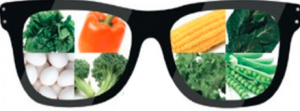 The National Eye Institute recommends a diet high in antioxidants, plus vitamin and mineral supplements. Antioxidants are nutrients that protect cells from damage caused by free radicals. Too many free radicals can contribute to eye disease, including age-related macular degeneration (AMD). Common antioxidants include vitamin A, vitamin B, vitamin C, vitamin E, vitamin D, selenium and zinc.
The National Eye Institute recommends a diet high in antioxidants, plus vitamin and mineral supplements. Antioxidants are nutrients that protect cells from damage caused by free radicals. Too many free radicals can contribute to eye disease, including age-related macular degeneration (AMD). Common antioxidants include vitamin A, vitamin B, vitamin C, vitamin E, vitamin D, selenium and zinc.
Eat Eye Foods
Lutein & Zeaxanthin
- Help to maintain healthy eye cells and keep the lens clear.
- Reduce oxidative stress on the eye and absorb blue and UV light.
- Your body cannot make lutein and zeaxanthin, so you must consume them regularly.
- Food Sources:
- Orange Vegetables: Orange Peppers, Sweet Potato, Pumpkin, Butternut Squash, Carrots
- Leafy Green Vegetables: Kale, Spinach, Romaine Lettuce, Radicchio, Leaf Lettuce, Arugula
- Green Vegetables: Brussels Sprouts, Broccoli, Peas, Green Beans
- Fruit and Juice: Avocado, Kiwi, Dried Apricots, Berries, Citrus, & Other Fruits
- Eggs
Beta Carotene
- When taken with zinc and vitamins C and E may reduce the progression of AMD.
- Efficient antioxidant that can scavenge free-radicals
- Food Sources:
- Orange Vegetables: Sweet Potato, Pumpkin, Butternut Squash, Carrots
- Green Vegetables: Brussels Sprouts, Broccoli, Peas, Green Bean
- Fruit and Juice: Cantaloupe, Kiwi, Dried Apricots, Berries, Citrus, & Other Fruits
Meso-zeaxanthin
Meso-zeaxanthin is not found in daily diet, it is produced from Lutein.
Other Important Nutrients
Vitamin A
- May protect against night blindness and dry eyes.
- Food sources:
- Beef or chicken liver, spinach, kale, eggs, butter, milk, carrots, cantaloupe, corn, nectarines, peaches, pumpkin, squash, sweet potatoes, tomatoes, watermelon.
Retinol
- Required for the production of the visual pigment used to see in low light levels.
- Food sources:
- egg yolk, sardines, liver
Lycopene
- Efficient antioxidant that can scavenge free-radicals
- Food sources:
- Cooked tomatoes and tomato based foods, watermelon, pink grapefruit.
Vitamin B Complex
- The combination of vitamins B6, B12 and folate may help to protect against AMD
- Food Sources:
- B6: sunflower seeds, bananas, whole grains, legumes, beans, nuts, meats, fish, eggs, fortified breads and cereals.
- B12: poultry, shellfish, yeast extract, eggs, meat, dairy
- Folate: beans, legumes, kidneys, whole grains, peas, citrus fruits, fruit juices, wheat bran, dark green leafy vegetables, poultry, pork, shellfish, liver
Vitamin C
- Help to provide protection from free-radical damage done by ultraviolet light.
- May reduce the risk of cataracts and macular degeneration
- Food Sources:
- Oranges, grapefruit, cantaloupe, berries, mangoes, kale, Brussels sprouts, peppers, sweet potatoes and tomatoes, sweet peppers (red or green), broccoli
Vitamin E
- When combined with carotenoids and vitamin C, may reduce the risk of AMD.
- Food sources:
- Almonds, sunflower seeds, hazelnuts, broccoli, pumpkin, spinach, carrots, turnip greens, papaya, sunflower seeds, peanuts, peanut butter, wheat germ
Vitamin D
- May reduce the risk of macular degeneration.
- Food sources:
- Salmon, sardines, mackerel, milk, fortified orange juice.
- The best source of vitamin D is exposure to ultraviolet radiation from the sun. A few minutes of exposure to sunlight each day (without sunscreen) will insure your body is producing adequate amounts of vitamin D.
Zinc
- A high concentration is found in the macula.
- Helps the body absorb antioxidants.
- Helps vitamin A reduce the risk of night blindness.
- May play a role in reducing risk of AMD in certain patients. (Ask us about MaculaRisk genetic testing to find out if zinc is appropriate for you.)
- Food sources:
- Oysters, beef, Dungeness crab, dark turkey meat, natural dark cocoa, nuts, beans, dairy
Selenium
- When combined with carotenoids and vitamins C and E, may reduce risk of AMD.
- Food sources:
- Shrimp, crab, salmon, halibut, Brazil nuts, enriched noodles, brown rice, cremini mushrooms, whole grains, tuna, beef, dark meat turkey
Bioflavonoids (Flavonoids)
- May protect against cataracts and macular degeneration.
- Food sources:
- Tea, red wine, citrus fruits, bilberries, blueberries, cherries, legumes, soy products
Omega-3 Fatty Acids
- May help protect your eyes from age-related macular degeneration (AMD) and dry eye syndrome. Your body cannot produce omega-3 fatty acids, so you must get them from your food or supplements.
- Note: Limit omega-6 fatty acids, which interfere with your body’s ability to absorb and use the good omega-3 fats.
- Food sources:
- Cold-water fish such as sardines, herring, salmon and tuna. Eye doctors typically recommend a diet high in omega-3 fatty acids to reduce the risk of eye problems. Other foods containing omega-3 fatty acids are flaxseeds, walnuts and dark green leafy vegetables
